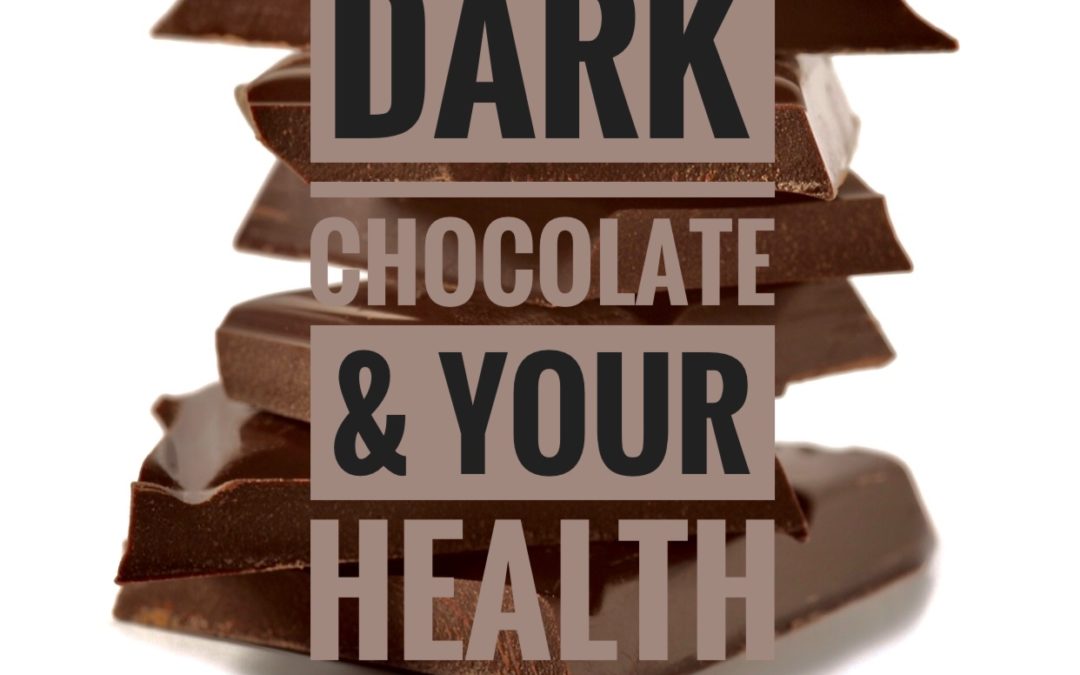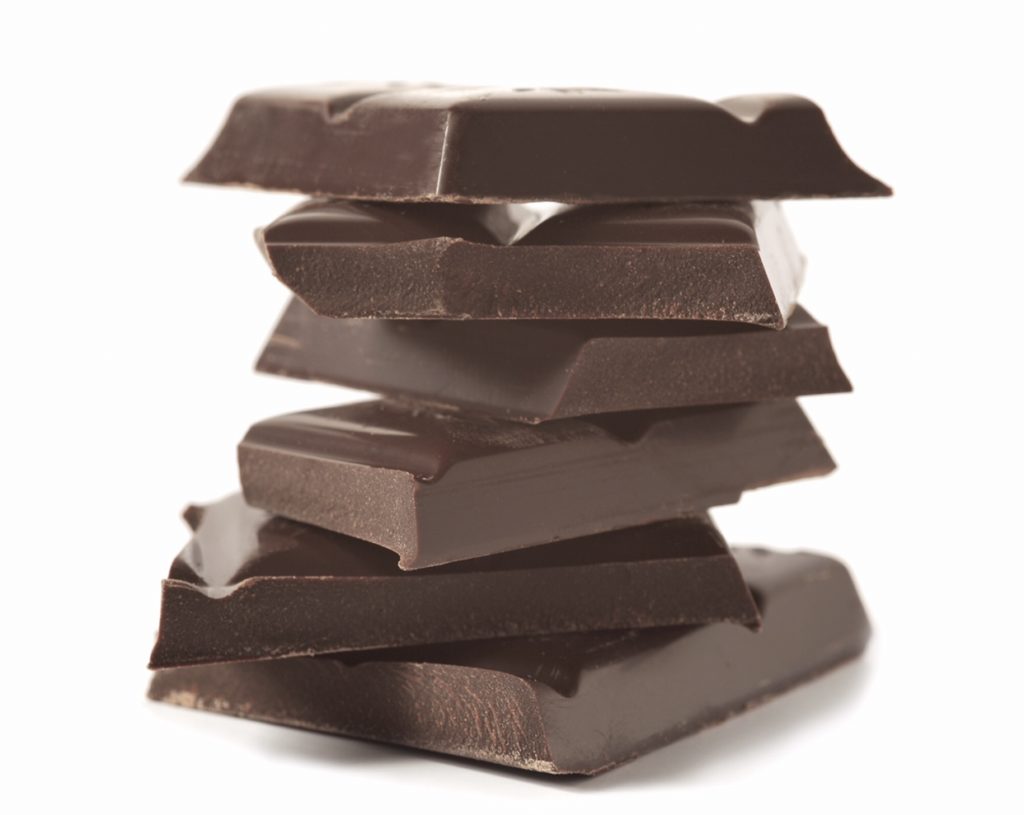Dark chocolate contains flavonoids that offer more than just a sweet treat. Studies show that it can play a positive role on heart health, weight management, diabetes and stress levels.

For 65 years, every Valentine’s Day, my great-grandpa bought his wife a big, heart-shaped box of chocolates. Evry year except for one, that is. What happened that one year he didn’t buy her one? She was on a diet.
Want to know what else happened that year? She didn’t talk to him for two weeks. Two weeks of the silent treatment might seem a bit much, but hey, the woman loved her chocolate.
My great-grandmarecently turned 104 years old. She no longer worries about dieting, and she eats all of the chocolate she desires.
While genetics plays a significant role in my great-grandma’s longevity, she may have been on to something with her favorite Valentine’s Day treat. Studies continue to show a positive connection between dark chocolate and health. The key word there is, dark chocolate.
The Flavonoid Antioxidant Compounds In Dark Chocolate
Dark chocolate contains more beneficial compounds than milk varieties. Along with pure cocoa, it contains cell-protecting flavonoid antioxidant compounds, too.
Flavonoids are natural compounds found in a variety of plant foods. They are thought to have health-promoting properties, due to their high antioxidant capacity. While fruits and vegetables are most commonly recognized for their flavonoid content, other plant foods – like tea, wine, grains and cocoa – are also rich sources. In fact, research shows that cocoa contains more phenolic antioxidants than most foods. Two tablespoons of pure cocoa has more antioxidant capacity than 3 ½ cups of green tea, ¾ cup of blueberries and 1 1/3 glasses of red wine.
Chocolate Is A Plant-Based Food
Chocolate bars don’t grow on trees, but cacao pods do. And, cocoa pods contain the cocoa seeds used to make chocolate. You can learn more about where chocolate comes from, and see the actual cocoa beans in my post, for the love of chocolate.
The Health Benefits Of Dark Chocolate
Like many other flavonoid containing plant foods, the cocoa used to make dark chocolate has been shown to offer some health benefits. Does that seem too good to be true? Here’s a quick overview of what some of the research shows.
Heart Health
Cardiovascular disease, or heart disease involves conditions of the heart, such coronary artery disease, congestive heart failure, high blood pressure and stroke. High cocoa consumption has been associated with a decreased risk of some cardiovascular diseases in a few different population studies. Specifically, many studies have linked cocoa consumption to a reduction in blood pressure and cardiovascular disease risk.
One study, in particular, associated just 6 grams (0.2 ounces) of dark chocolate per day with a 39% lower risk of heart attack or stroke.
Weight Management
Too much of anything can cause weight gain. And, that can then lead to other health complications. That’s why it’s important to eat dark chocolate in moderation to reap the benefits. It might even help control your appetite.
In a study comparing milk and darker chocolate, participants reported feeling more satisfied and less hungry after eating darker varieties of chocolate, compared to lighter. They reported a lower desire to eat something sweet and had a 17% lower daily ad lib calorie intake after eating the darker variety, too.
Diabetes
Studies suggest that dark chocolate consumption may benefit those with diabetes, too. Flavonoids increase the production of a compound known to help control insulin sensitivity. In one study, participants who ate dark chocolate 1x a day, for 15 days, saw their potential for insulin resistance drop by almost half. That same study showed benefits to vascular health and blood pressure, too.
Stress
In addition to the cardiovascualar, weight and diabetes benefits, dark chocolate may provide some brain health benefits, too. A review study published in the British Journal of Clinical Pharmacology, looked at the neuroprotective effects of cocoa flavanol and its influence on cognitive performance. They concluded that the flavonoids in cocoa appear to improve various types of cognitive and visual tasks. The results are likely from improved blood flow.
Chocolate is often associated with emotional comfort and has been reported to impact mood. Scientists conclude that those positive feelings are due to the endorphins that chocolate releases. One study showed that eating 1.5 ounces of dark chocolate, every day for two weeks, significantly reduced the stress hormone levels of very anxious people.
Consume Dark Chocolate In Moderation
Dark chocolate has some health benefits, but it’s important to remember that more is not better. To keep your consumption in check, make sure to consume it in moderation. Keep the following tips in mind when choosing and consuming dark chocolate.
- Not all chocolate is created equal. Look for varieties that are at least 70% cocoa.
- More is not better. According to research, the benefits of consuming dark chocolate are typically seen from consuming 0.5- 1.5 ounces a day.
- Dark chocolate is not a low-calorie or low-fat food, so watch your intake. You don’t have to eat a lot. Remember, it’s the bioactive flavonoids that are responsible for the benefits, and they are found in a wide variety of plant foods. Incorporate a variety of fruits and vegetables into your daily plan.
- Savor and be mindful with each bite of dark chocolate.



 Hi, I’m Heather – a registered dietitian, busy mom, consultant, adventure junkie and travel addict who has mastered living healthy on the go. My blog is where I share simple recipes and healthy living tips to help and inspire others to live their best life.
Hi, I’m Heather – a registered dietitian, busy mom, consultant, adventure junkie and travel addict who has mastered living healthy on the go. My blog is where I share simple recipes and healthy living tips to help and inspire others to live their best life.